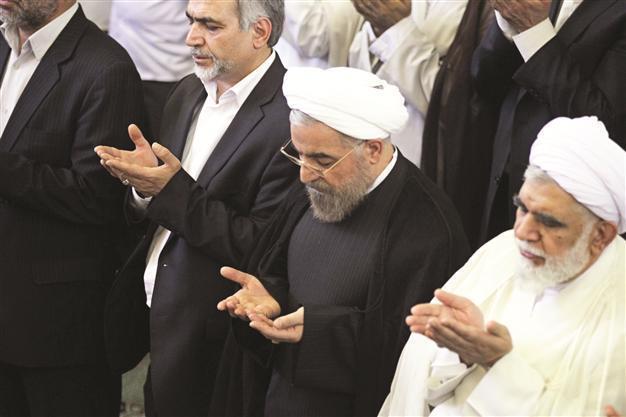Iran’s Rouhani vows to end political infighting
TEHRAN / JERUSALEM

Iranian President-elect Rouhani (C) attends the weekly Friday prayer with Shiite Muslim worshippers during the Ramadan. A relative moderate, Rouhani hints at the future government will not think of confrontation with Parliament. AFP photo
Iranian President-elect Hassan Rouhani has pledged to cooperate closely with Parliament and to limit confrontation within the legislative and executive branches, in contrast with President Mahmoud Ahmadinejad’s period in office, when infighting reached its highest level.“The future government will not think of confrontation with Parliament, nor will it think of, God forbid, fooling Parliament with inaccurate statistics,” Rouhani told deputies in a speech late July 14, according to the Mehr news agency.
“Certainly, solving the country’s problems will not be possible without cooperation between Parliament and the executive branch,” said Rouhani, who faces a tough challenge rebuilding an economy battered by international sanctions. The second term of Iran’s outgoing president, Ahmadinejad, was marked by extensive feuding with Parliament, which reached a peak in February when Ahmadinejad accused the family of speaker Ali Larijani of corruption.
Lawmakers have also harshly criticized Ahmadinejad for his administration’s implementation of subsidy reforms, which they say stoked inflation.
Rouhani won a landslide victory over more conservative rivals in a June 14 poll and will take office next month. Parliament must also approve Rouhani’s nominations for Cabinet positions and these have been the subject of widespread speculation in the Iranian media in recent weeks.
“The country faces very difficult conditions, and some of these complexities are the result of domestic performance and some are the result of unjust foreign pressures,” Rouhani said, referring to the sanctions. “This is the first time that the country has faced very high inflation - the highest in the region and perhaps in the world - coupled with negative economic growth.”
International sanctions levied over Iran’s nuclear program have placed pressure on the country’s economy, contributing to inflation of above 30 percent, rising unemployment and a weakening of the Iranian rial. Rouhani leveled his first criticism of the outgoing administration since the election, saying it has mismanaged the economy. “We asked current officials about the situation of the country but their reports and those of our teams were very far from each other,” he said in remarks published by the pro-reform Shargh daily.
Meanwhile, Israeli Prime Minister Benjamin Netanyahu said the world should not trust Iran’s newly elected president, adding that Tehran is still pressing forward with a program designed to develop a nuclear weapon, and the signs of moderation coming from Rouhani were merely “cosmetic.”
‘Smile and build bomb’
Speaking on CBS-TV’s “Face the Nation,” Netanyahu called the new Iranian president a “wolf in sheep’s clothing.”
“He’s criticizing his predecessor [Ahmadinejad] for being a wolf in wolf’s clothing. His strategy is being a wolf in sheep’s clothing. Smile and build a bomb,” he said. He urged the United States to make clear to Rouhani that it would not allow Iran to build a nuclear weapon, and that military force “is truly on the table.” Iran has been at loggerheads with world powers for years over its nuclear drive, which Western nations believe is aimed at developing atomic weapon capability. Iran denies Western charges that it is pursuing nuclear weapons, saying its program is for peaceful purposes.
Compiled from AFP, AP and Reuters stories by the Daily News staff.
















